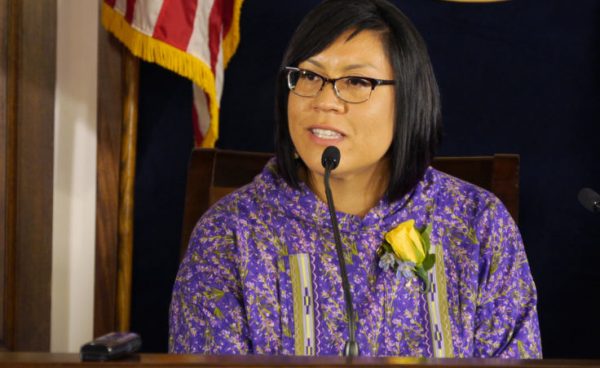
In March, Alaska House District 38 Rep. Tiffany Zulkosky introduced a bill for the state to acknowledge Alaska’s 229 federally recognized tribes. House Bill 123 has passed through two committees and is headed to the house floor for a vote. Comments from the bill’s supporters were drawn from hearings before the Alaska House Committee for Tribal Affairs, and an online forum hosted by the Tlingit and Haida Central Council.
In 2017, the state entered its first-ever compact with Alaska’s tribes through the Alaska Tribal Child Welfare Compact. In 2019, Gov. Mike Dunleavy announced plans for a state tribal compact for education. But Zulkosky says those and any other potential state and tribal partnerships would be built on a broken foundation.
“It’s difficult, I believe, for us in the legislature to really talk about expanding the existing relationship with tribes when we have not taken the first formal step in acknowledging the relationship with tribes,” Zulkosky said.
Tribes are sovereign. Zulkosky said that’s why many of Alaska’s 229 federally recognized tribes were able to enforce travel restrictions in their communities during the COVID-19 pandemic. The federal government has acknowledged this power and status of tribal governments. The state’s legislature has not recognized tribes, which is what House Bill 123 is seeking to change.
The question central to this bill is: What would be the difference if the state were to recognize Alaska’s tribes? Zulkosky and other supporters of the bill say that legally, nothing would change.
“It is not something that somehow expands tribal authority or sovereignty,” said Liz Medicine Crow, who is Tlingit and Haida and CEO and President at First Alaskans Institute. “The state doesn’t have that authority. That is inherent sovereignty born to us from the very beginning of our creation.”
“By officially recognizing Alaska tribes, the state of Alaska will not give us a benefit we don’t already have,” said Vivian Korthuis, President and CEO of the Association of Village Council Presidents. “Instead, the State of Alaska will gain a benefit. That benefit is a partner.”
“The core of the issue is, can the state learn how to be a good partner with tribes?” Medicine Crow said. “And recognition is a mechanism for that government-to-government relationship to be harnessed and put to good work for all Alaskans.”
Richard Chalyee Eesh Peterson, president of the Central Council Tlingit and Haida Indian Tribes, said the state has good reason to seek partnerships with tribes. For one, he said, tribes have access to funding through their relationship with the federal government.
“Especially in these times of budget constraints, we save the State of Alaska hundreds and hundreds of millions of dollars,” Peterson said.
Peterson said the Alaska tribal health system alone subsidizes the state with hundreds of millions of dollars per year. And earlier this year, Alaska became the first state in the nation to offer a COVID-19 vaccine to all adults. That was possible in large part due to a vaccination campaign by tribal health organizations partnered with the federal Indian Health Service.
Medicine Crow wants the state to join the partnership that tribes have with the federal government, so all three governments can work together on the many issues currently facing Alaskans.
“That’s three chances to make life better for Alaskans,” Medicine Crow said. “Imagine what we could do with education, with transportation, with justice, with public safety, corrections, all of these services.”
House Bill 123 has 12 co-sponsors in the House. It has passed through the Tribal Affairs Committee and the State Affairs Committee and is headed to the House floor for a vote.




